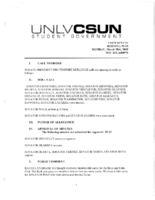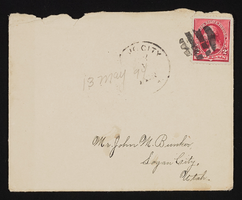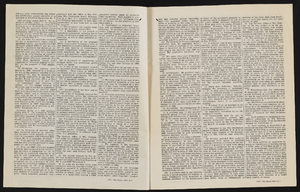Search the Special Collections and Archives Portal
Search Results
Las Vegas African American Community Conversations round table interviews
Identifier
Abstract
The Las Vegas African American Community Conversations is a four-part conversation with local Las Vegans. The first part of the round table is moderated by Trisha Geran with a central theme of "Migration, Work and Community Emergence." The panelists discuss the early history of the African American community in Las Vegas, Nevada. They also discuss how and why their families moved to Las Vegas, most citing the economic opportunities as a major factor. The participants share their personal histories and family histories building up the African American community in downtown Las Vegas and the Westside. The second part of the round table is moderated by Sonya Horsford with a central theme of "Education, Economy, and Integration." The panelists discuss the Clark County School District pre- and post-integration. They discuss the hardships of the Sixth Grade Center Integration Plan on the African American community as well as discussing the differences in the school facilities. The round table participants also discuss the social services and social programs and the history of those programs from the African American perspective. They also discuss civic involvement and the various civic groups started by the panelists, and share discrimination they faced.
The third part of the round table is moderated by Claytee D. White with a central theme of "Civil Rights and Entertainment." The panelists discuss the racism and segregation present in Las Vegas and discuss how African American community leaders worked to integrate African Americans into the Las Vegas community. They discuss the 1969 riots in detail, and discuss African American entertainers and the entertainment industry. They share personal experiences working in the entertainment industry and discuss the importance of the local unions, such as the Culinary Workers Union Local 226, the International Alliance of Theatrical Stage Employees Local 720, and their contributions to the unions. The fourth and final part of the round table is moderated by Rachel Anderson with a central theme of the "Early African American Legal Community." The panelists discuss the foundations of the professional legal community in Las Vegas, noting the contributions of Charles Keller, Dr. William Bailey, and the Reverend Marion Bennett as driving forces for civil rights activism in Las Vegas. They share their experiences growing up in Las Vegas facing discrimination and segregation. Lastly, they share the changes they have seen and how both the legal and African African communities have grown.
Archival Collection

Meeting minutes for Consolidated Student Senate, University of Nevada, Las Vegas, March 28, 2005
Date
Archival Collection
Description
Text

Letter and envelope from Mary Etta Syphus, Provo, Utah to John M. Bunker, Logan Utah
Date
Archival Collection
Description
From the Syphus-Bunker Papers (MS-00169). The folder contains an original handwritten letter, an envelope, a typed transcription of the same letter, and a copy of original letter attached.
Text
Jon Ralston (Nevada Independent) oral history interview conducted by Kelliann Beavers and Kristian Thymianos: transcript
Date
Archival Collection
Description
From the Lincy Institute "Perspectives from the COVID-19 Pandemic" Oral History Project (MS-01178) -- Business interviews file.
Text

Transcript of interview with Juan Saa by David G. Schwartz, November 21, 2016
Date
Archival Collection
Description
Text

Transcript of interview with Jonathan Sparer by Stefani Evans and Claytee White, August 29, 2016
Date
Archival Collection
Description
Jonathan “Jon” Sparer of Las Vegas, Nevada, is a retired architect who is active in the local Jewish and LGBTQ communities. He grew up on Long Island, New York, in the hamlet of Woodmere, where his father was an importer. After graduating in Architecture from Ohio State University in 1977 Jon moved to Los Angeles, California, where he worked first with architect Jack Chernoff, then with architect Bob Barnett until 1981, when he accompanied his future wife and college classmate who worked for Martin Stern to Las Vegas. Stern sent her to open a field office to supervise the reconstruction of the MGM Grand after it burned in November 1980. Once in Las Vegas, Jon began working for architect Homer Rissman on Steve Wynn’s future project, The Mirage. Although Jon switched firms, he continued working on The Mirage and other Wynn projects with Marnell Corrao, where he would stay until 2001. Ironically, Jon’s original supervisor at Marnell Corrao was his future husband, architect John R. Klai II; Klai’s subordinate in turn was Jon’s Spring Valley neighbor. After Jon left Marnell in 2001, he became a founding principal architect at YWS Design & Architecture. Although he has retired from full-time architecture, Jon has since designed the Temple for Congregation Ner Tamid (pictured above) and The Center (Las Vegas's gay, lesbian, bisexual, transgender, queer community center). Jon remains active in the AIA Las Vegas Chapter as the incoming president as well as serving as a board member for Jewish Family Services Agency and The Center.
Text




